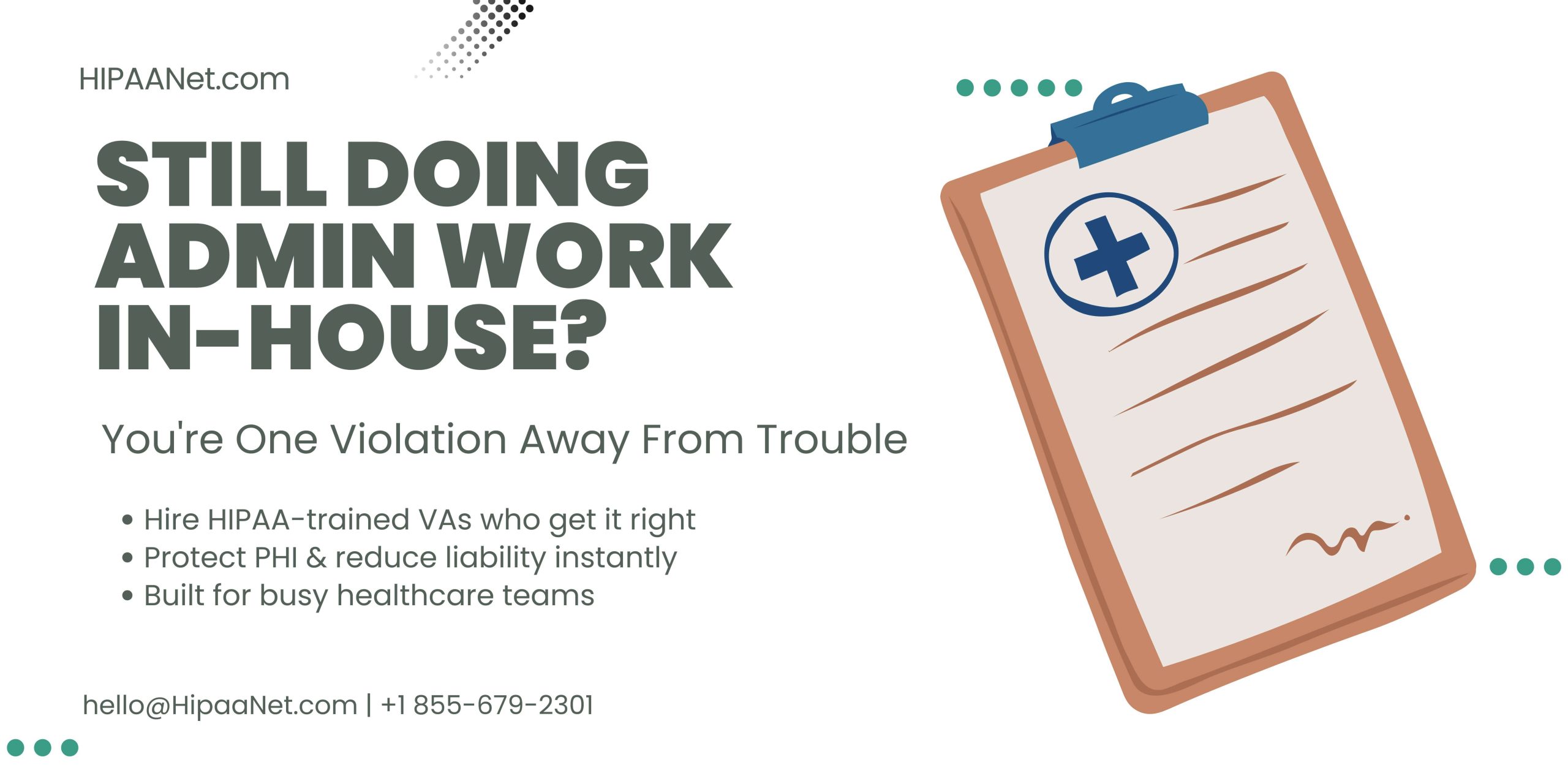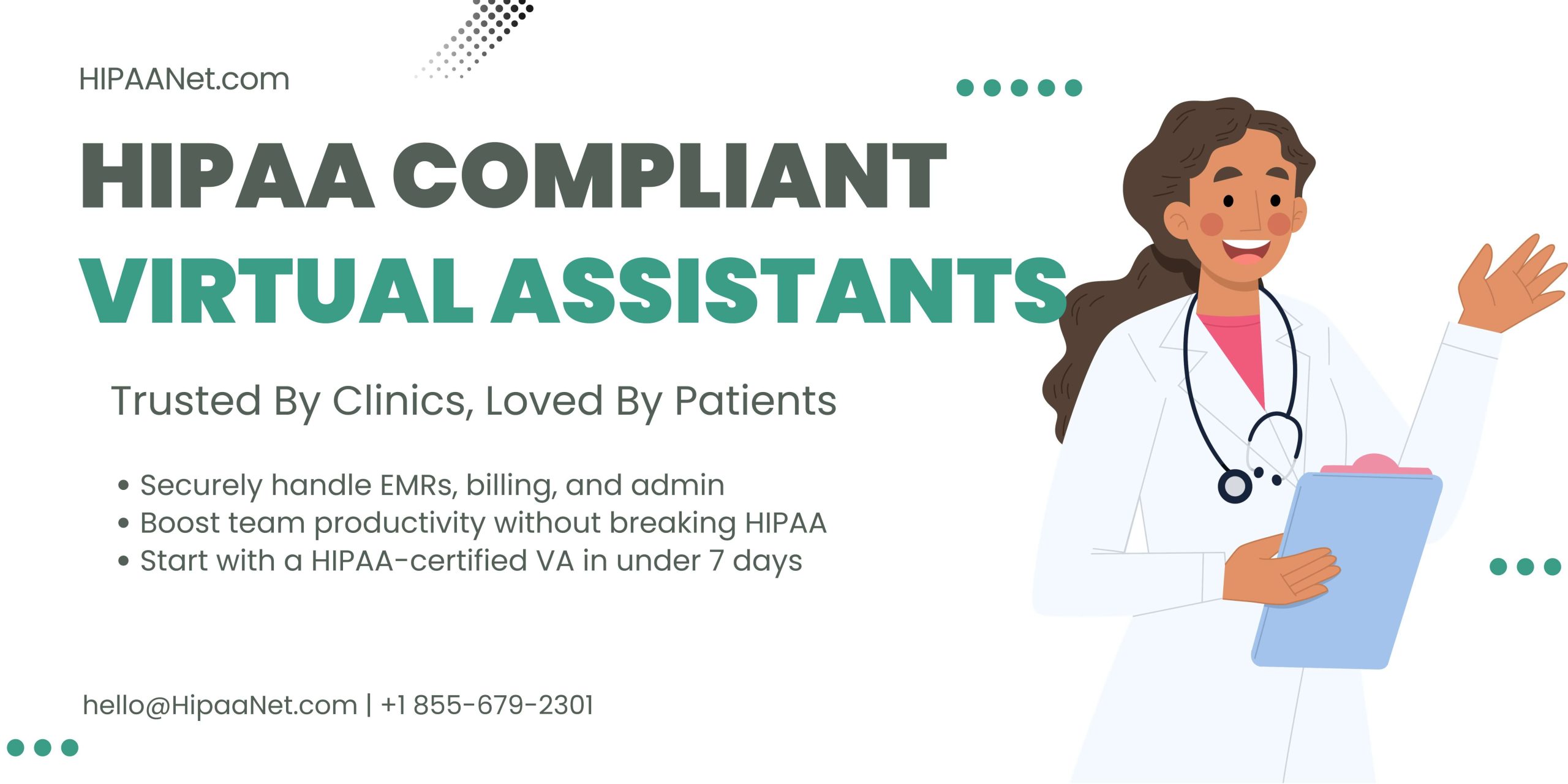Navigating medical billing can feel overwhelming, especially when dealing with third-party billing processes. Many healthcare providers face challenges like delayed payments and complex claim submissions, which can lead to cash flow issues.
These problems can disrupt your practice and impact patient care.
Without an efficient system, you risk losing revenue and frustrating your patients. Studies show that nearly 30% of claims are denied on the first submission, costing practices valuable time and resources.
The good news is that third-party billing services can streamline your billing process, ensuring timely payments and reducing administrative burdens.
With HIPAANet, you get expert support tailored to your needs, maximizing your revenue while focusing on what matters most—providing excellent patient care. Let’s explore how our services can transform your billing experience.
Overview Of Third-Party Billing Medical
Third-party billing medical involves a service where a healthcare provider bills a third party, such as an insurance company, for medical services provided to patients.
This process is vital for managing payments and ensuring that healthcare services remain accessible to everyone. However, navigating the third-party billing medical landscape presents challenges.
1. Common Challenges in Third-Party Billing Medical
Many healthcare providers encounter issues with third-party medical billing. For instance, nearly 30% of claims are denied on the first submission, resulting in lost revenue and frustration.
Delayed payments can hinder cash flow, making it difficult for practices to pay staff and maintain facilities. Providers can struggle with complex claim submissions, resulting in more denied claims and increased administrative burdens.
2. Consequences of Ineffective Billing
Ineffective third-party billing medical processes affect both healthcare providers and patients. When claims are denied, providers may spend several hours correcting and resubmitting them.
This can lead to longer payment wait times and an overall decline in patient care. Patients might experience unexpected bills due to billing mistakes, causing stress and confusion.
3. A Solution: HIPAANet Services
Finding a solution to these challenges is crucial. HIPAANet specializes in handling third-party billing medical processes efficiently. Outsourcing your billing tasks to HIPAANe frees up time and resources, allowing you to focus on what matters most: patient care.
4. Why Outsourcing to HIPAANet is the Best Choice
Outsourcing third-party medical billing to HIPAA Net offers several advantages:
- Expertise: HIPAANet has a team of experts who understand the ins and outs of third-party medical billing. They know common pitfalls and how to avoid them.
- Improved Cash Flow: By ensuring quick and accurate billing, HIPAANet helps maintain your practice’s cash flow, reducing payment delays
- Reduced Administrative Burdens: HIPAANet handles complex claim submissions, allowing you to focus on patient care instead of paperwork.
5. Moving Forward with Effective Billing
Many healthcare providers find that working with HIPAA Net significantly improves their financial standing. By addressing third-party billing medical challenges, you can maintain a steady income. Improving your billing process ultimately benefits your patients and practice.
For comprehensive information about effective billing practices, visit the following links: the American Medical Association and the Centers for Medicare & Medicaid Services.
Addressing the complexities of third-party billing in medical no longer has to be daunting. Choose to work with HIPAANet and see a positive change in your billing process today.
Importance Of Third-Party Billing
Third-party billing plays a critical role in the healthcare industry. Without it, healthcare providers would struggle to manage their finances effectively. Understanding this process benefits you as a patient and a provider.
Benefits For Healthcare Providers
- Improved Cash Flow: Third-party billing allows your practice to receive payments more consistently. Reliable payments ensure you can cover overhead costs and invest in new equipment or staff.
- Reduced Administrative Burden: Handling billing yourself can overwhelm your staff. Third-party billing services like HIPAA Net let you delegate these tasks, allowing your team to focus on patient care rather than paperwork.
- Faster Payment Processing: Third-party billing services streamline the claims submission process. With expert knowledge and efficient systems, these services can help speed up insurance company payment times.
- Fewer Claim Denials: When providers handle billing internally, they encounter numerous errors, leading to denied claims. HIPHIPAANet’s experience significantly reduces this risk, ensuring that claims are submitted correctly the first time.
- Better Compliance: Navigating healthcare regulations can be challenging. HIPAANet professionals stay up-to-date on billing regulations and compliance, minimizing the risk of penalties and audits.
- Enhanced Reporting: Third-party billing services often offer detailed financial reports that provide valuable insights into your practice’s performance. These reports can help you make informed financial decisions.
- Professional Expertise: Billing companies have staff explicitly trained in the complexities of healthcare billing. This expertise often translates into higher revenue recovery for your practice.
Benefits For Patients
- Transparent Billing: Patients benefit from clear and concise billing. Third-party billing ensures transparency in costs and helps avoid unexpected charges.
- Reduced Stress: Managing medical bills can be intimidating. When providers utilize third-party billing, patients experience fewer billing errors and better communication, leading to less anxiety.
- Streamlined Claims Process: Patients see faster processing of insurance claims, which leads to shorter wait times for reimbursement from their insurance companies.
- Access to Payment Plans: Many third-party billers offer flexible payment options, making healthcare more accessible to patients struggling with high medical costs.
- Improved Customer Support: Third-party billing services often provide dedicated customer service representatives. These representatives help answer patients’ questions about their bills and insurance claims, enhancing overall satisfaction.
- Better Health Outcomes: When healthcare providers can focus on delivering care rather than administrative tasks, patients receive a higher quality of service. This focus leads to improved health outcomes.
Integrating third-party billing into your practice can significantly streamline your operations and improve your finances. As you consider this change, consider outsourcing to HIPAANet.
Their expertise simplifies the billing process, reduces errors, and provides the financial stability necessary for delivering quality patient care.
For more insights into effective billing practices, check the American Medical Association or the Centers for Medicare & Medicaid Services, which offers essential resources.
Types Of TThird-PartyBillers
Understanding third-party billing in healthcare helps navigate its complexities. Different types of third-party billers play unique roles, enhancing the payment process for services rendered. Here’s a breakdown of the primary types.
Insurance Companies
Insurance companies are the primary type of third-party billers. They pay for medical services based on their agreements with healthcare providers.
Patients often select insurance plans that cover specific treatments, allowing providers to submit claims for reimbursement.
- Commercial Insurers: These organizations, including Anthem and Aetna, often handle private insurance policies. They may cover various healthcare services, including hospital stays, outpatient care, and preventive care.
- Managed Care Organizations (MCOs): MCOs, such as Health Maintenance Organizations (HMOs), contract with healthcare providers to offer various services. They emphasize preventative care and cost-efficiency, which can impact billing processes.
- Medicare and Medicaid: Medicare covers seniors and specifically disabled individuals, while Medicaid serves low-income individuals and families. Both government programs require specific billing procedures, often complicating provider efficiency.
Government Programs
Government programs form another crucial type of third-party billers. These programs often establish unique billing guidelines, influencing the financial interactions between providers and patients.
- Medicare: A federal program for individuals aged 65 and older or those with disabilities. It involves various parts that cover hospital stays, outpatient care, and prescription drugs. Each part has different billing rules that providers must follow.
- Medicaid: A state and federal partnership assisting low-income individuals and families. Medicaid billing varies by state, creating challenges for providers in adhering to multiple regulations.
- Veterans Affairs (VA): The VA provides healthcare services to eligible veterans. Depending on service-connected conditions, billing for services can include additional layers of complexity.
Navigating these types of third-party billers requires strategic approaches. Providers face challenges like delayed payments and claim denials. Every kind of biller has compliance norms and regulations that can lead to frustrations if not managed effectively.
Utilizing HIPAANet services eases the burden by ensuring accurate claims submission and faster payments, which improves healthcare providers’ overall cash flow.
HIPAANet acts as an expert in handling third-party billing. Their experienced team helps you reduce administrative burdens, allowing you to concentrate on patient care.
With HIPAANet, challenges associated with third-party billing can diminish, leading to a healthier financial practice.
Common Challenges In Third-Party Billing
Third-party billing presents several challenges for healthcare providers, affecting financial processes and patient care. Understanding these issues can help identify practical solutions.
Delays In Payment
Payment delays often occur within third-party billing. Providers experience long waiting periods for reimbursements, impacting cash flow and overall financial health.
For instance, insurance companies may take weeks or even months to process claims. This extended timeline can create significant stress for healthcare practices.
Providers face challenges with administrative tasks, which consume valuable time. When there is a backlog in claims processing, your practice might struggle to meet operational expenses.
Patients experience uncertainty regarding their medical expenses, leading to confusion and frustration.
Turning to HIPAA services can alleviate these issues. By outsourcing billing tasks, you access expert assistance in handling tedious paperwork and follow-ups.
HIPHIPAANet’s knowledgeable staff helps ensure faster payment cycles. This proactive approach enhances cash flow and allows providers to prioritize patient care.
Denied Claims
Denied claims represent another common hurdle in third-party billing. Statistics indicate that nearly 30% of claims are denied upon initial submission, complicating healthcare providers’ financial management.
Reasons for denial include inaccurate information, missing documentation, and failure to comply with insurance requirements.
When claims are denied, providers endure additional steps to rectify issues, resulting in lost revenue and increased administrative workload. Reworking denied claims drains time and resources that could be better spent serving patients.
Engaging HIPAANet services can improve the denial rate. Their expertise helps ensure accurate claims submission, reducing the likelihood of denials.
With HIPAANet managing your billing operations, you’ll spend less time addressing claims and more time focusing on what matters: patient care.
Choosing HIPAANet empowers your practice to combat the challenges of third-party billing effectively. You’ll experience smoother processes, timely payments, and fewer denials. This partnership creates a more favorable environment for both providers and patients.
For more insights on improving billing processes, refer to resources from the American Medical Association or the Centers for Medicare & Medicaid Services.
Best Practices For Efficient Third-Party Billing
Third-party billing medical means asking someone other than the patient to pay for health services. When you visit a doctor, you may not pay them directly.
Instead, your insurance or government program covers the costs. This process can be a bitnd there areny cnges thathat t arise.
Challenges in Third-Party Billing
You might wonder why third-party billing can be a problem. One challenge is that about 30% of claims get denied right away. That means when your healthcare provider sends a bill to the insurance company, the company says “no” for various reasons.
If this happens, your provider will spend extra time fixing these claims. This can delay payments, making it difficult for them to manage their finances.
The consequences of denied claims can be severe. It can lead to longer wait times for healthcare providers to get paid. Patients might then receive unexpected bills, causing confusion and stress.
Solution: HIPAANet Services
The best way to solve these problems is by using HHIPAA Netservices. HIPAANet specializes in third-party medical billing and helps make the process easier.
Their expertise streamlines the billing, ensuring that claims are submitted correctly the first time. This means fewer denied claims and faster payments.
Outsourcing to HIPAANet also allows healthcare providers to spend less time on billing and more time on patient care. With these services, your healthcare provider can focus on what they do best – taking care of you.
Why Outsourcing to HIPAANet Is the Best Choice
Choosing to use HIPAA means gaining access to professional expertise. They know the ins and outs of third-party medical billing. HIPAANet keeps up with billing guidelines and regulations, which can change often. This means your claims get processed smoothly.
Another reason to opt forHIPAA Nett services is their reporting capabilities. You will get clear insights into the billing process. This transparency helps you understand what is happening with your claims.
Knowing this information clears up confusion and makes it easier for patients and providers to work together.
Benefits of Effective Third-Party Billing
- Improved Cash Flow: When you work with HIPAANet, expect quicker payments. You won’t have to worry as much about waiting a long time for reimbursement.
- Reduced Administrative Burden: Providers can focus on patient care instead of chasing payments.
- Fewer Claim Denials: HIPAANet’s expertise helps minimize mistakes in claim submission, leading to more successful claims.
- Better Compliance: HIPAANet is familiar with the latest regulations and guidelines, ensuring compliance for your practice.
You can visit resources like the American Medical Association or the Centers for Medicare & Medicaid Services for more comprehensive information on billing practices.
Working with HIPAA leads to smoother third-party billing medical processes. Patients enjoy a more straightforward experience, and healthcare providers benefit from timely payment resolutions.
When you think about how challenging billing can be, hiring HIPAANet as your third-party billing medical service might be your best decision.
Conclusion
Navigating the complexities of third-party billing can feel overwhelming. However, with the right support, you can enhance your practice’s financial health and improve patient experiences.
HIPAANetiss a reliable partner that streamlines billing processes and mitigates common challenges like denied claims and payment delays.
By outsourcing your billing tasks, you’ll ensure timely payments and free up valuable time to focus on what truly matters—providing quality care to your patients.
Embracing efficient billing practices is crucial for sustaining your practice’s success in today’s healthcare landscape.
Frequently Asked Questions
What is third-party billing in healthcare?
Third-party billing involves healthcare providers submitting claims to insurance companies for payment of services rendered. This process is essential for managing finances in healthcare, as it ensures providers receive reimbursements for their services.
Why do claims get denied on the first submission?
Claims can be deniedforo various reasons, including incorrect information, missing documentation, or non-compliance with insurance guidelines. Nearly 30% of claims face denial initially, impacting cash flow and patient billing.
How can HIPAANet help with medical billing?
HIPAANet offers expert support in streamlining the billing process for healthcare providers, ensuring timely payments and reducing administrative burdens. Their services help improve cash flow and allow providers to focus more on patient care.
What are the benefits of outsourcing billing to HIPAANet?
Outsourcing billing tasks to HIPAANet leads to improved cash flow, fewer claim denials, faster payment processing, and reduced administrative work. This enables healthcare providers to concentrate on delivering high-quality patient care.
What challenges do healthcare providers face with billing?
Providers often struggle with payment delays, complex claim submissions, and handling denied claims. These challenges can complicate financial management and lead to operational difficulties, affecting providers and patients.
How dopayment delayst affect healthcare providers?
Payment delays can severely impact a provider’s flow, leading to operational struggles and uncertainty for patients. Providers may wait weeks or months for reimbursements, hindering their financial stability.
What types of third-party billers are there?
Third-party billers include insurance companies, managed care organizations, and government programs like Medicare and Medicaid. Each has unique billing guidelines that can complicate the payment process for healthcare providers.
What are the best practices for efficient third-party billing?
Best practices include ensuring accurate claims submissions, maintaining proper documentation, and outsourcing billing to experts like HIPAANet. These strategies help reduce denied claims and streamline the payment process.
How does HIPAA ensure compliance with regulations?
HIPAANet stays updated on billing guidelines and industry regulations, ensuring all claims submitted comply with the necessary standards. This expertise minimizes the risk of denied claims and enhances overall billing efficiency.
Where can I find more resources on effective billing practices?
For more information on effective billing practices, you can visit the American Medical Association and the Centers for Medicare & Medicaid Services resources, which provide valuable insights into healthcare billing standards.






